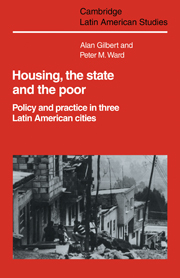Book contents
- Frontmatter
- Contents
- List of figures
- List of tables
- Acknowledgements
- Abbreviations
- 1 Introduction: the research issues and strategy
- 2 Bogotá, Mexico City and Valencia: the social, economic and political backcloth
- 3 Access to land
- 4 Servicing low-income settlements
- 5 Community organization: participation or social control?
- 6 Conclusions
- Appendix 1 The methodology in detail
- Appendix 2 Description of the survey settlements
- Notes
- Bibliography
- Author index
- Subject index
- CAMBRIDGE LATIN AMERICAN STUDIES
6 - Conclusions
Published online by Cambridge University Press: 04 August 2010
- Frontmatter
- Contents
- List of figures
- List of tables
- Acknowledgements
- Abbreviations
- 1 Introduction: the research issues and strategy
- 2 Bogotá, Mexico City and Valencia: the social, economic and political backcloth
- 3 Access to land
- 4 Servicing low-income settlements
- 5 Community organization: participation or social control?
- 6 Conclusions
- Appendix 1 The methodology in detail
- Appendix 2 Description of the survey settlements
- Notes
- Bibliography
- Author index
- Subject index
- CAMBRIDGE LATIN AMERICAN STUDIES
Summary
Most of our findings have been presented in the summaries at the end of each chapter and will not be repeated here. There are, however, a number of general statements which need to be made about our results. In particular, we would like to take this opportunity to emphasize those elements of our work which we believe to be original, affect planning practice or which warrant further development.
Our work has clearly underlined the point made in the recent social-science literature that issues such as housing, land use and servicing cannot sensibly be isolated from the wider social, economic and political environment. In the past, planners too often tried to separate these issues in order to better resolve urban problems; the practical mistakes that have been made often reflect that error. Work in the social sciences during the seventies has clearly shown that such a separation is unjustifiable. In this study we have tried to place the land, housing and servicing issues facing the poor in their broad socio-economic context. We have emphasized how home improvement depends upon income levels of the poor and upon the costs of land and materials. We have shown how tenure is less a matter of individual choice than an outcome of the broad working both of the capitalist land market and of the action of the state. We have demonstrated how methods of servicing low-income settlement vary with the nature of bureaucracy and political practice in each country.
- Type
- Chapter
- Information
- Housing, the State and the PoorPolicy and Practice in Three Latin American Cities, pp. 240 - 254Publisher: Cambridge University PressPrint publication year: 1985



